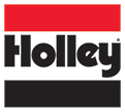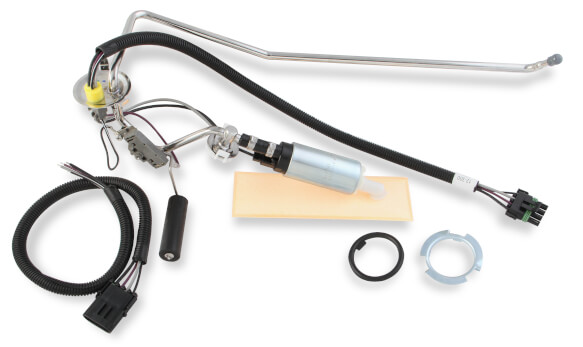HOLLEY 255 LPH OE STYLE EFI FUEL TANK MODULES
1967-69 Camaro/Firebird/1968-72 Nova
Part number (SKU): 12-300
Brand:
Holley

Share on Social Media
Original Price: $348.95
• This in-tank fuel pump module is a high-pressure unit that flows 255 liters per hour (LPH) and is capable of supporting electronic fuel injection (EFI) engines producing up to 550 horsepower • A pre-calibrated fuel-level sending unit designed to work with the factory fuel gauge for this application is included • This module also features a HydraMat filter which has a unique internal reservoir that keeps fuel available at the pick-up and also provides protection from contaminates Fuel pressure is internally regulated to 58 psi eliminating the added expense and effort of purchasing and installing an external fuel pressure regulator – no separate return line is required because this module returns excess fuel right inside the tank! This 1967-69 GM F-body Muscle Car EFI Fuel Pump module was designed as a direct replacement for your factory pick-up and sending unit. There is no need to purchase a custom EFI fuel tank. You can even retain the factory fuel hard line – just connect the outlet of the pump module to the hard line on your vehicle with EFI-rated fuel hose and hose clamps available in the Earls Vapor Guard line. This Muscle Car EFI Module includes a 255 LPH fuel pump and a Holley HydraMat. HydraMat is an amazing patent-pending fuel reservoir system that reduces fuel starvation issues that might otherwise occur while cornering, accelerating, stopping, traversing inclines, and during low fuel conditions.
| Application | 1967-69 Camaro/Firebird |
|---|---|
| 1968-72 CHEVY II / NOVA | |
| Brand | Holley |
| Emission Code | 5 |
| Free Flow LPH | 255 |
| Fuel Sending Unit Ohms | 0-90 Ohms |
| Fuel Type | Gasoline |
| Inlet Diameter (in) | 5/16″ |
| Product Type | Fuel Pump Module |
| Vent Size | N/A |
| Warranty | Limited 90 Day |
This part is legal for sale or use on Emissions Controlled Vehicles, Uncontrolled (Non-Emissions Controlled) Vehicles, and Racing Use Only Vehicles because it does not affect vehicle emissions and is not covered by emissions regulations.


Leave a Reply